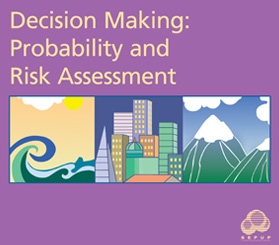Decision Making: Probability and Risk Assessment – Module Issues in the News for Students

News
Scroll down to read summaries of recent news related to decision-making and risk assessment.
More Beach Pollution or Flawed Sampling Methods?
In 2001, 19% more beaches were closed because of contaminated water than in 2002. But experts say the water is cleaner than before. So why are the beaches being closed? Scientists at the University of California at Irvine say it is because of the way the water is being tested.
Scientists studied 43 years of water quality data at Huntington Beach, California, and determined the water is cleaner now than it has ever been. Water quality depends on many factors, such as tidal cycles, seasonal rainfall, and El Nino events. They theorize that the increased number of closures is because there is now more beach monitoring and a lower acceptable limit for levels of bacterial contamination.
The way the water is sampled is also in question. Beach closings are determined by the results of a single water sample. Experts say that water quality changes quickly, and that one sample does not give a true picture of overall water quality. Instead, they recommend a method that averages the results of multiple samples from a single beach before a decision is made.
Should you use a cell phone while driving?
A driver who uses a cell phone is almost twice as likely to be involved in a rear-end collision than someone not using a cell phone. The good news is these collisions are less likely to cause serious injuries or deaths than other rear-end collisions. Researchers at the University of North Carolina at Chapel Hill surveyed 650 state residents, 500 of whom were cell phone users. They also analyzed more than 452 cell phone-related crashes in North Carolina.
Driving in the city was more dangerous than in the country, as 9 out of 10 of the accidents occurred in metropolitan areas. The time of day mattered as well. Most accidents occurred at midday or in the afternoon. If a person has to use a phone, a hands-free phone is safer, according to a related study of 29 accidents. All but one of these accidents involved a driver using a hand-held phone.

